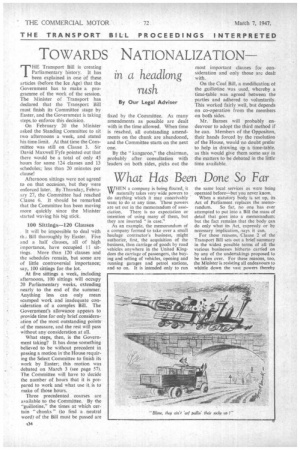• TOWARDS NATIONALIZATION—
Page 44

If you've noticed an error in this article please click here to report it so we can fix it.
in a headlong rush
By Our Legal Adviser THE Transport Bill is creating Parliamentary history. It has been explained in one Of these articles (before the lee Age) that the Government has to make a programme of the work of the session. The Minister of Transport has declared that the Transport Bill must finish its Committee stage by Easter, and the Government is taking steps.to enforce this decision.
On February 20 the Minister asked the Standing Committee to sit two afternoons a week, and stated his time limit. At that time the Committee was still on Clause 3. Sir David Maxwell Fyfe pointed out that there would be a total of only 45 hours for some 124 clauses and 13 schedules; less than 20 minutes per clause!
Afternoon sittings were not agreed to on that occasion, but they were enforced later. . By Thursday, February 27, the Committee had reached Clause 6. It should be remarked that the Committee has been moving more quickly since the Minister started waving his big stick.
100 Sittings-120 Clauses It will be impossible to deal with th _: Bill thoroughly by Easter. Five and a half clauses, all of high importance, have occupied 11 sitrings. More than 120 clauses and the schedules remain, but some are of little controversial importance; say, 100 sittings for. the lot.
At five sittings a week, including afternoons, 100 sittings will occupy 20 Parliamentary weeks, extending nearly to the end of the summer. Anything less can only mean scamped work and inadequate consideration of a complex Bill. The Government's allowance appears to provide time for only brief consideraation of the most outstanding points. of the measure, and the rest will pass without any consideration at all.
What steps, then, is the Government taking? It has done something believed to be without precedent in passing a motion in the House requiring the Select Committee to finish its work by Easter;. this motion was debated on March 3 (see page 57). The Committee will have to decide the number of hours that it is prepared to work and what use it is to make of those hours.
Three precedented courses are available to the Committee. By the "guillotine," the times at which certain " chunks " (to find a neutral word). of the Bill must be passed are 134 fixed by the Committee. As many amendments as possible are dealt with in the time allowed. When time is reached, all outstanding amendments on the chunk are abandoned, and the Committee starts on the next one.
By the "kangaroo," the chairman, probably after consultation with leaders on both sides, picks out the
most important clauses for consideration and only those arc dealt with.
On the Coal Bill, a modification of the guillotine was used, whereby a time-table was agreed between the parties and adhered to voluntarily. This worked fairly well, but depends on co-operation from the members on both sides.
Mr. • Barnes will probably endeavour to adopt the third method if he can. Members of the Oppositon, their hands forced by the resolution of the House, would no doubt prefer to help in drawing up a time-table, as this would give them some say in the matters to be debated in the little time available.












































































